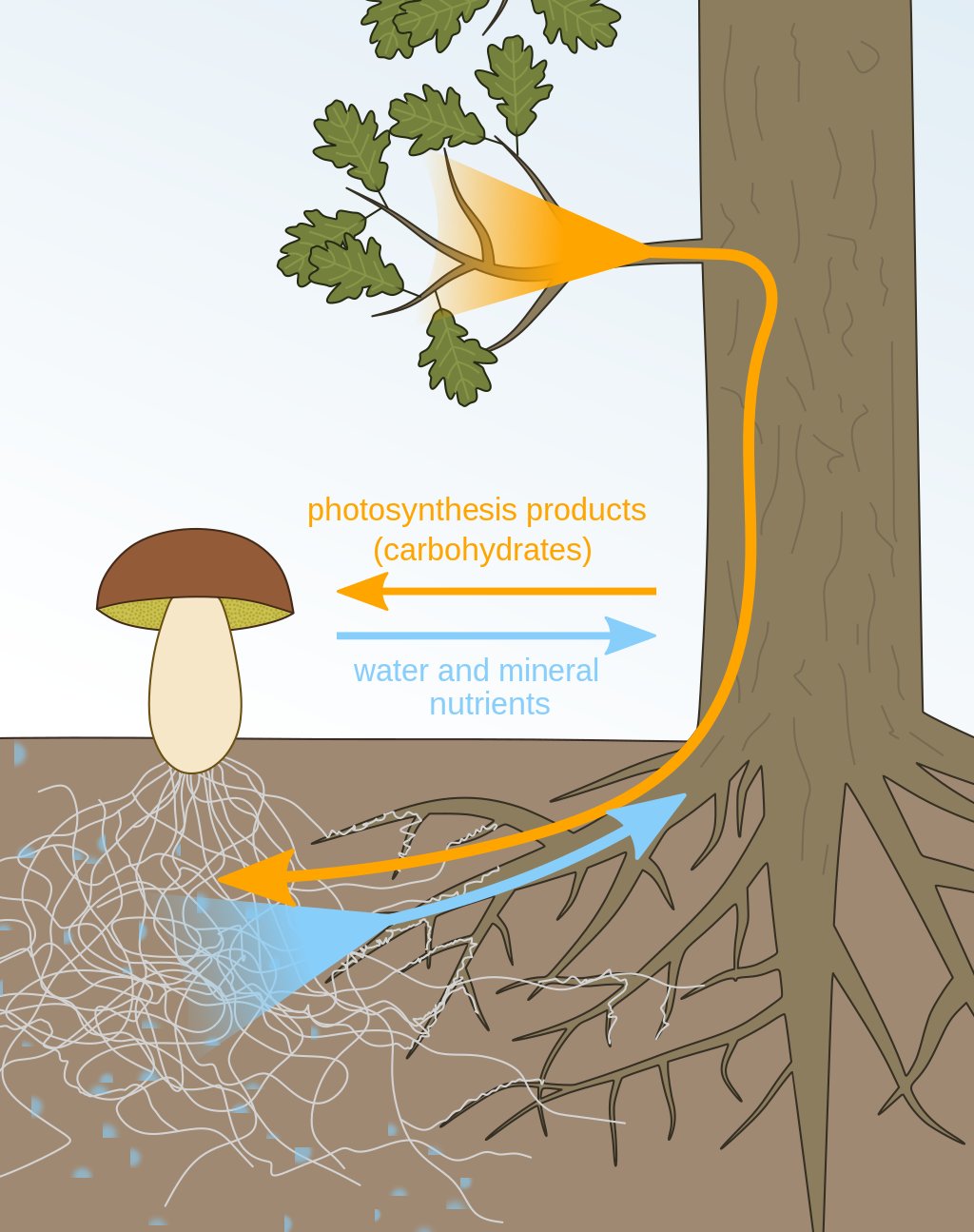Breastfeeding Benefits for the Mother
"Breastfeeding is a beautiful symphony of hormones which orchestrate a harmony of emotions and responses."
Breastfeeding is like a fungus and a tree. In most scenarios, a fungus would take nutrients like sugars and organic compounds from the tree to produce its mushroom fruit. In turn, the fungus helps the tree absorb water and essential nutrients found deep in the soil that are difficult for the roots to reach, helping the tree to thrive. It is one of many symbiotic relationships found in nature. Breastfeeding is no different—the mother produces nutrient-rich, immune-protective food for the baby, while the baby helps the mother recover from pregnancy and birth.
The common perception is that breastfeeding only offers benefits to the baby. From boosting immunity to providing optimal nutrition, breastfeeding is celebrated for the nourishment it gives to infants. However, there’s another important side to this relationship that is often forgotten—breastfeeding also offers a range of benefits to mothers. Whether feeding at home or on the go, using a breastfeeding cover can provide added comfort and privacy, making the experience more convenient in different settings. In this blog post, we’ll explore the physical, emotional, and practical advantages that breastfeeding provides to mothers.
1. Accelerated Postpartum Recovery
Breastfeeding helps new mothers recover from childbirth more quickly. These are some of the specific aspects to recovery:
- Uterine Contraction: When a mother breastfeeds, her body releases oxytocin. This hormone is responsible for contracting muscles. Once the oxytocin is released to contract the muscles surrounding the milk glands, the uterus muscles are also triggered to contract. This aids in shrinking the uterus back to its pre-pregnancy size and reduces postpartum bleeding.
- Weight Loss: Breastfeeding burns calories—up to 500 extra calories a day! That is almost the same as going for a 10km run every day. This naturally helps many mothers return to their pre-pregnancy weight faster, contributing to overall postpartum recovery and fitness.
- Reduced Postpartum Bleeding: As we know, oxytocin helps contract the uterus, helping to minimize blood loss after delivery. The greater the preservation of blood supply to the body, the faster the healing process and reducing the risk of postpartum anemia. The early and ongoing secretion of oxytocin is the key in speeding up the recovery.


Caréne Joubert
/ Bump to Babe Founder"Several studies suggest that breastfeeding mothers have a lower incidence of postpartum depression compared to mothers who formula-feed."
2. Lower Risk of Certain Health Conditions
Breastfeeding is not only beneficial for immediate postpartum recovery but also reduces the long-term risk of several health conditions:
- Breast and Ovarian Cancer: Studies have shown that breastfeeding helps to reduce the risk of developing certain reproductive cancers, such as breast and ovarian cancer. The assumption is that woman who breastfeed are exposed to less estrogen in their lifetime. Estrogen acts as a catalyst for tumor growth due to its function of stimulation cell proliferation and division in the breast tissue. Breastfeeding for an extended period significantly lowers the risk of breast and ovarian cancers. The longer the duration of breastfeeding, the greater the protective effect. Studies have indicated that the risk for developing breast cancer is reduced by 4.3% for each year of breastfeeding (National Institute of Health. 2013).
- Type 2 Diabetes: Pregnancy takes a significant toll on the maternal body. The glucose and lipid metabolism changes to a more insulin resistant state. These changes occur naturally to varying degrees, all in support of the growing fetus. However, it is damaging to the mother’s health and can even lead to gestational diabetes. Breastfeeding has the opposite effect on the maternal body by improving insulin sensitivity. Studies have described this as the “Reset Hypothesis”, explaining how these positive metabolic changes of breastfeeding persist even after weaning. For this reason, mothers who breastfeed have a 4 to 12% lower risk of developing type 2 diabetes later in life. The breastfeeding exclusivity also plays a role in the reduction of the risk for type 2 diabetes. The risk was found to be 50% higher for mothers who never exclusively breastfed, compared to those who breastfed exclusively for the period studied at 1 to 3 months (National Institute of Health. 2013).
- Cardiovascular Health: Pregnancy also causes the maternal body to be in a hyperlipidemic state, with a lot more circulating cholesterol and triglycerides. These lipids are known to negatively affect heart health if the blood levels are in excess. Lactation in turn positively affects maternal blood lipid levels, therefore breastfeeding mothers are less likely to suffer from heart disease and hypertension. This long-term benefit may also be attributed to the positive effect that breastfeeding has on a mother’s metabolism and weight regulation as mentioned above.
3. Emotional and Mental Health Benefits
Breastfeeding is a beautiful symphony of hormones which orchestrate a harmony of emotions and responses. Breastfeeding has been found to contribute to a mother’s emotional well-being and mental health in the following ways:
- Bonding with Baby: The act of breastfeeding encourages close skin-to-skin contact, enhancing the bond between mother and baby. Often during breastfeeding the mother and baby make eye contact, further promoting emotional connection, love and affection. The release of oxytocin, also known as the “love hormone,” fosters feelings of closeness and calmness. Research has found that the release of this potent neurochemical greatly benefits maternal as well as infant emotional well-being (Modak A, et al. 2023).
- Reduced Risk of Postpartum Depression: Several studies suggest that breastfeeding mothers have a lower incidence of postpartum depression compared to mothers who formula-feed. The oxytocin released during breastfeeding can have calming effects, which may help alleviate stress and anxiety. Prolactin, known as the milk producing hormone, is also released, which is associated with feelings of nurturing. Breastfeeding also requires focused attention and relaxation, similar to that of meditation, which further alleviates feelings of sadness and anxiety (Modak A, et al. 2023).
- Confidence and Empowerment: Successfully breastfeeding can provide mothers with a sense of accomplishment and confidence. Knowing they are providing optimal nutrition for their baby can strengthen their self-esteem and overall emotional resilience during the early stages of motherhood. Seeing the baby grow and develop provides constant reassurance in the mother’s own capabilities and fulfillment in motherhood. Conquering the challenges of breastfeeding and persevering to continue breastfeeding, creates a feeling of mastery and skill, often promoting confidence in other areas of parenthood.
- Promotes Responsive parenting. Breastfeeding requires frequent and intimate parent and infant interactions. These mothers have more opportunities to learn and respond to the baby’s needs and become effective in identifying the baby’s cues for hunger, discomfort or the need for comfort. Together with the strong emotional bond mentioned above, this fosters responsive parenting (Modak A, et al. 2023).
4. Practical and Financial Advantages
While these financial and practical aspects might not be directly related to maternal health, they may significantly influence the decision to breastfeed as well as the motivation to continue for and extended duration. Breastfeeding is not only beneficial for health; it’s also a practical and cost-effective choice for many families:
- Cost Savings: Formula feeding can be extremely expensive. Breastfeeding can significantly reduce the financial burden on families by eliminating the need for formula, bottles, and feeding supplies. Using formula as the primary feed could cost approximately R1800 to R6500 per month. Looking at a global scale, it is estimated that the cost of NOT breastfeeding is approximately 302 billion dollars in economic losses. In addition to saving money from not having to buy formula, babies who are breastfed tend to have fewer infections and illnesses, mothers may also save on medical expenses such as doctor visits and medications.
- Convenience: Breastfeeding requires no preparation, making it incredibly convenient, especially during nighttime feedings or when traveling. Milk is always available, at the right temperature, and free from contamination risks. In certain areas, access to clean safe water is limited, adding significant risk to illness and even death when formula cannot be prepared safely.
- Reduced Absenteeism: Since breastfed babies tend to have stronger immune systems and get sick less often, breastfeeding mothers may experience fewer days off work due to infant illness.
5. Environmental Benefits
Breastfeeding is beneficial to the entire planet! The environmental benefits of breastfeeding are so often overlooked and just not spoken about enough in my opinion. Breastfeeding is the most environmentally conscious infant feeding method:
- Zero Waste: Breastfeeding is prepared fresh, readily available and the perfect temperature. It does not produce any packaging waste, unlike formula feeding, which involves plastic bottles, tins, and other disposable products. Formula production is a resource intensive process, requiring 4000L of water to produce just 1kg of formula powder. Breastfeeding minimizes a mother’s environmental footprint and contributes to a more sustainable lifestyle.
6. Long-Term Health Benefits
Apart from the reduced risk of metabolic diseases and reproductive cancers, breastfeeding also offers several other long-term health benefits to mothers:
- Natural Birth Control (Lactational Amenorrhea): While not foolproof, exclusive breastfeeding often delays the return of a mother’s menstrual cycle and ovulation, providing a natural form of birth control in the first six months postpartum. This can help space out pregnancies naturally, which is beneficial for maternal recovery and health.
- Bone Health: Although breastfeeding temporarily lowers a mother’s bone mineral density, studies show that women who breastfeed experience long-term benefits in bone health, reducing their risk of osteoporosis later in life. This is thought to occur due to the increased maternal calcium absorption through the diet, as well as the increase release of the osteocalcin hormone which is responsible for building new bone.
7. Breastfeeding in Public Tip - Use a Breastfeeding Cover
Certainly! Here’s a short paragraph you can add to the blog to naturally incorporate breastfeeding cover into the content:
For moms who prefer a bit more privacy while nursing, a breastfeeding cover can be a helpful accessory.
Whether you’re out in public or hosting visitors at home, a cover provides a comfortable way to breastfeed discreetly while keeping your baby focused and relaxed. From lightweight muslin wraps to full-coverage apron-style designs, there are many options to suit your style and needs.
While not essential for breastfeeding success, a good cover can offer peace of mind and convenience when nursing on the go.
Conclusion
Breastfeeding is a deeply personal choice, but the benefits for mothers go far beyond providing nutrition to their baby. From faster recovery after childbirth to long-term protection against chronic diseases, breastfeeding supports maternal health in profound ways. Additionally, the emotional, financial, and environmental benefits make it a holistic choice that can improve the overall well-being of both the mother, her family and the whole world.
For mothers who can and choose to breastfeed, the rewards are significant, offering a nurturing experience that enhances both physical health and emotional bonds with their child. Whether breastfeeding for a few months or several years, mothers who breastfeed are investing not only in their baby’s health but in their own as well.
If you’re a new or expecting mother, it’s worth considering the benefits of breastfeeding for both you and your baby—and remember, support from healthcare professionals and loved ones can make the breastfeeding journey easier and more fulfilling.
References
Breastfeeding and Health Outcomes for the Mother-Infant Dyad. National Institute of Health. 2013
Modak A, Ronghe V, Gomase K P (October 09, 2023) The Psychological Benefits of Breastfeeding: Fostering Maternal Well-Being and Child Development. Cureus 15(10): e46730. DOI 10.7759/cureus.46730







